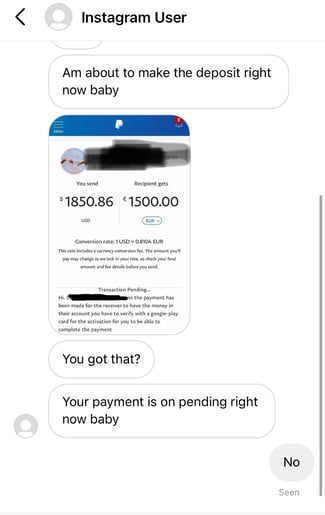
Here's a reminder that scams can happen anywhere — even on your favorite social media platform
I’m a young woman in my 20s and am an active Instagram user. Recently, I was scrolling through my Instagram feed and received a notification about a new direct message request. I saw an older man pictured in the channel’s photo. The direct message read, “Hey my name is Walker and I am looking for a sugar baby. I would like to pay you 1,500 Euro weekly.” Although this came across as an obvious scam attempt, I got curious. So I responded. I first asked “Walker” what he would like me to do in return, after which he told me that he was simply looking for someone to talk to since his wife had passed away. To this, I asked how I could be sure that he wasn’t trying to scam me. He sent me some pictures of girls holding up papers that had “Walker paid me 1,500 Euro” or “Walker is a real sugar daddy” written on them. (However, he quickly unsent these messages after sending them — this part of the story remains somewhat of a mystery to me.) I told him then, “Okay, let's do it!” At this point, I was really curious what would happen. He asked me for my sharable PayPal payment link and I sent it to him. What then happened was, put simply, predictable. Walker sent me a picture that the payment would be pending and he would need me to send him an amount first to get it verified. The picture stated that he requested money from me and he’d need me to verify it using a Google Play card. Unfortunately for Walker, the picture had obviously been faked. I blocked him. As I’ve described above, aspiring “sugar daddies” lure in their victims through direct messages on Instagram with messages that sound (and are) too good to be true. They first try to gain your trust and before carrying on with requesting payment. When they do get around to requesting payment “verification”, these scammers will disappear as soon as the money is sent and has come into their possession. The payment for the verification is mostly done over prepaid cards, like Google Play or Amazon Cards. These are payment methods that can’t easily be refunded. This scam is far from unique nowadays — many young women are affected by similar ploys from cybercriminals across the globe. Some of these women may have a difficult financial situation and could use the money. Alternatively, they may just be looking for a certain standard of living that they can't otherwise afford. The alleged “sugar daddies” exploit these situations to make a profit — and end up causing a lot of damage. As a rule of thumb, it’s safe to assume that whenever something seems to be good to be true, that’s usually the case. Here are a few additional steps that you can take to prevent yourself from being scammed. Scams can happen anywhere — even on your favorite social media platform. When you come across such cases, if possible, report them directly to the network where they appear, whether it’s Instagram, Facebook, TikTok, or another channel. This is one step toward making the internet a safer place for us all. Further reading:

How do sugar daddy scams work?
How can you avoid being scammed?
4 tips to avoid being phished
Social engineering – it’s not just about phishing
如有侵权请联系:admin#unsafe.sh